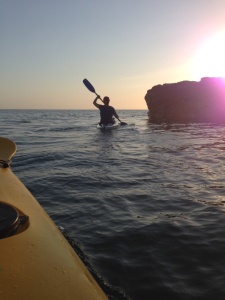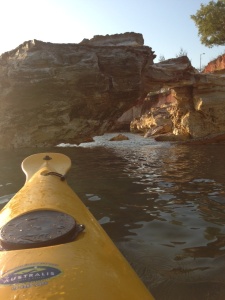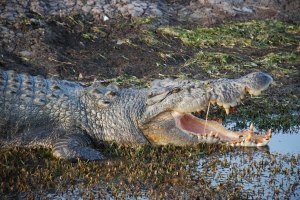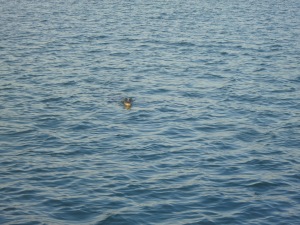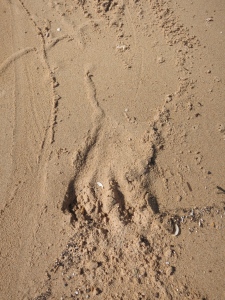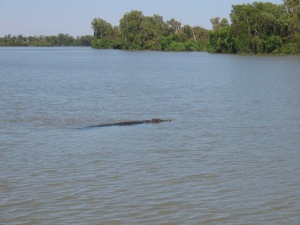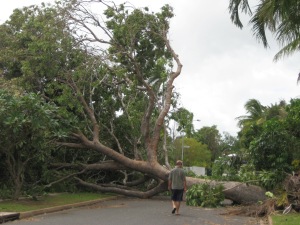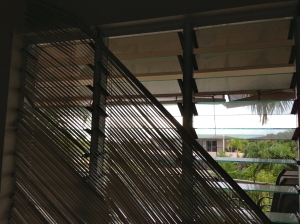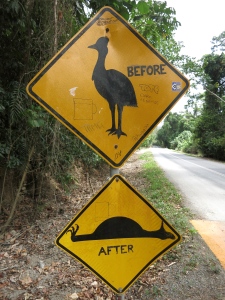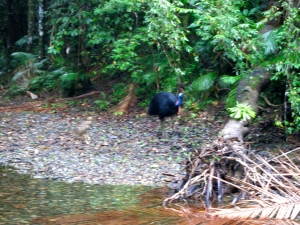Last time I left you, I was sitting on the back of the boat (metaphorically, at least), waiting to give birth. My first time around—severe pre-eclampsia, an emergency forceps delivery, nearly two litres of blood loss, a platelet transfusion and the cord around Little Tea’s neck requiring him to have a turn on the recuscitation table— did not give me high expectations. At the very least, I anticipated torn and fissured body parts. Faux-cheerful midwives giving pep talks. Offers of one-use medical equipment for our tackle box. My obstetrician to arrive at our delivery room wearing crocs. Sobbing like I was being tortured on a particularly sadistic episode of Game of Thrones. A fractious baby to look after at the end of it all.
I did not, however, think to imagine a literal cyclone in my midst.
But that was the word around the hospital bed while my membranes were ruptured. “Didja see the paper,” the midwife said. “How about that,” said my doctor. “A cyclone. 20-50% chance. Friday. Or the weekend.”
This is what Darwin small talk looks like.
I grimaced and stared out the window. Clear skies and clouds of dragonflies. That’s all I could see for hours, as I paced around the maternity ward pushing an oxytocin drip with a wheel like a dodgy shopping trolley. The dragonflies–with their beady eyes, spindly legs, translucent wings–fluttered just beyond the glass, shoving their freedom right up in my face. Everything they promised was far more tantalising than the prospect of childbirth, or the departmental noticeboard, filled mostly with the promise of breastfeeding classes and photographers who would like to put your child in a beanie and then a bucket.
Cyclone, pffftttt, I thought. Go home already, wet season. You’re drunk.
Later, when I was mainlining museli bars, Allen’s Party Mix, and riding contractions, the rain rolled in. The dragonflies kept buzzing, confused but undeterred. But I forgot about the promised cyclone. I had other distractions. By 5.30pm, I was holding my daughter and crying, eating Irish stew one-handed while I waited for the epidural to wear off.
On limited sleep and clutching a newborn, I was far from well informed and two days later, I was reassuring my mother-in-law about said impending cyclone on the phone.
It’ll fizzle out along the coast well before it hits Darwin, I promised.
She was charged with the care of Little Tea while we were in the hospital. “Should I go to the shops?” she asked.
Nah, I said. Hang tight. Plenty of food in the cupboard. Feel free to break the glass on the emergency packet of Kingstons. *
The next morning we woke to news of a direct hit projected for Darwin. Category 2. By 11am. We were still in hospital, Little Tea and my mother-in-law were at home in the Northern Suburbs. By the time we decided Mr Tea should leave and ride it out with them, it was too late.
Grey sheets of weather combed the hospital grounds; gusts of wind bent palm trees to snapping point, then released them just in time.
We lay on the bed, with the newest Baby Tea in between us, staring out the window, scrolling on our phones. It was a bit like watching Q&A while reading the tweets.
Power out in Ludmilla, Stuart Park. Howard Springs. A gas explosion at Coolalinga.
The radar images showed a whirlpool: all the shades of white and grey and blue, with a reach across the Arafura and Timor Seas but the darkest pigments converging right above us. In the heavy-set hospital building, we were as safe as we could be, but what of Little Tea, my mother-in-law, our house? I was edgy, fidgeting.
I’m just going to go out on the verandah and have a look, I said.
“You will not! Don’t be stupid,” said Mr Tea. “It’s way too dangerous.”
I waited for a few more tortured minutes. And then pretended I was getting some more nappies from the nurses’ station and snuck out onto the balcony.
The pot plants had tipped over; the tiles pooled with water. I pushed on the glass door, it resisted. I expected the wind to howl me down.
It didn’t.
Outside, it felt like any other severe thunderstorm I’ve watched slash through Darwin. But there was an eerie edge. The sound of it. Or the lack of sound. I could just hear a faint but angry whistle. Like a heavy mouth breather rattling away on a pillow slip. A kind of pitch and frequency that normally only a dog can hear. I watched two more layers of rain fold onto the verandah and retreated inside, to our room, to Mr Tea, and our newborn wrapped in flannel.
But as it turns out, this is Darwin’s biggest cyclone for more than 30 years. Stories filter through over the next 24 hours before we leave the hospital. Trees down, roads impassable. Smacked up houses, collapsed fences, live wires dangling over pools. Bunnings has sold out of chainsaws and generators.
One of the midwives tells me about her twisted security gate and how a giant pot was upturned on her veranda, a house plant that originally took several people to move. But a lone business card is still firmly planted on the ground where it was dropped days ago. My friend Ange has trees down on her shed and brushing the roof of her house, but her two chickens, Screamin’ Jay and Marty, are not only survivors, they’ve even managed to lay four eggs.
For at least one third of Darwin, the electricity is severed for days, and for some, even longer. My friend Jenelle later describes one of the nights of hot, unbroken air at her house in Alawa. The stillness punctuated by the intermittent whine of a neighbour’s generator. Then at 4am, there is suddenly silence. And then, the sound of metal hitting concrete.
“Work, you bastard!”, her neighbor roars, kicking the broken-down genny across his carport.
Cyclone Marcus: it is the best of Darwin; it is the worst of Darwin.
People open their houses to strangers; they offer showers, washing machines, power points to charge mobile phones. They lend generators. They share fridge and freezer space. Even the ice machine at the petrol station is hosting tubs of ice-cream and boxed up left-overs. The local Sikh community hands out meals at the Jingili Water Gardens; the Salvation Army hosts movie nights.
Other folk steal boat motors, raid closed businesses, prey on empty homes. They threaten legal action on the owners of fallen trees. Before we leave the hospital, Mr Tea reads me a story from the paper about an old mate at a caravan park who refused to be evacuated. “I was here for Tracy,” he said. “Marcus is just a baby.” His caravan was still standing, but the bloke next door was not so fortunate. Old mate crowed in victory. “Never liked him anyway.”
As we drive home from the hospital, the damage becomes clear. Flapping corrugated iron, twists of metal, upturned trailers and traffic signs. It’s indiscriminate. A house with the roof caved in nestles between homes that are untouched. The nature strips along Rocklands Drive look like a giant, rampaging toddler has run through, plucking out some of the biggest trees and leaving smaller ones. Not this one! That one. THAT ONE!
The only physical destruction I expected this week was my own. But this time around, I’ve escaped childbirth without even a stitch. Darwin has taken the king hit for me.
On one street, I spy a cluster of neighbours clearing a driveway together with chainsaws. On another, a man carefully aims a leaf blower at an already immaculate and manicured lawn. It’s that best and worst of Darwin in real time, playing out within a hundred metres. A lesson for life, I think to myself. You can choose to be a chainsaw or a leaf blower. Be a chainsaw. Always, always – choose to be a chainsaw.*
Across the suburbs, along Dripstone Cliffs, the Nightcliff Foreshore, and all down Bagot Road, some of my favourite trees are down. Old banyans, spiny casuarinas, the ghost-like eucalypts, some of the great canopies of Darwin shade. They have been toppled, snapped, stumped, wrenched from the soil. Clods of dirt dangle from giant tree roots. I miss them already. People are inspecting the carnage, taking photographs. Cyclone selfies – by the end of the weekend, it’s a thing.

By no means the worst examples of tree carnage, but bad enough. This is the park next door to where we live.
The ocean churns along the beach, around the jetty. The surfers are out in force.
I’m still not sure what I’ll find at home. Electricity? A traumatised toddler and mother-in-law? What about the house, the backyard? The towering African Mahogany in the park next door – how could that possibly still be standing?
But it is. When we pull into the driveway, I realise we’re among the lucky ones. Little Tea is sanguine and my mother-in-law is unfazed. The garden is littered with palm fronds, the pool filled with branches, perhaps there are a few more cracked tiles on the roof, but that’s the extent of our damage. We need to boil drinking water, but there’s power to do it. I settle our newest born into her bassinet and furtively turn on the air conditioner.
I feel guilty about having electricity, about the people across my suburb winching, chopping, cleaning, lifting branches off houses. I think back to the man with the leaf blower, the neighbours with the chainsaws. This is my first cyclone where I’m not broadcasting; I have no involvement with essential services. I want to be out helping. Then I look down at my post-partum body, my leaking breasts. I get a whiff of baby spew, of unwashed armpit. Second time around, birth might have been easier but I’m still exhausted.
Maybe I get a free pass on Marcus.
*Except on those occasions when you can’t be a chainsaw. Because you just had a baby or something. In which case, you exhausted wretch, I give you (and by you, I mean me) permission to just eat a packet of biscuits and lie the fuck down.



